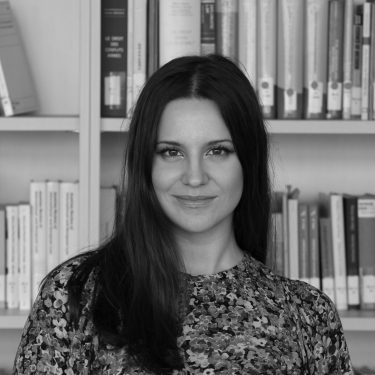Welcome to the fifth interview of the Völkerrechtsblog’s symposium ‘The Person behind the Academic’! With us we have Prof. Rohini Sen, and through the following questions, we will try to get a glimpse of her interests, sources of inspiration and habits.
Welcome Prof. Sen and thank you very much for accepting our invitation!
May I first ask what it was that brought you to academia and what made you stay?
My entry into academia is a combination of circumstances and chance, I suppose. I come from a family of teachers (from primary school to universities) and growing up in this lifestyle subconsciously conditioned me to seek out academia, I imagine. That apart, at some point during my primary education, I discovered a fondness for reading, writing, and performative public speaking. These eventually led me to academia. I ‘joined’ professional academia at 23, right after my LLM and proceeded to teach full-time for 8 years before starting my PhD (which also happens to be on teaching) so, it feels predetermined in some ways at this point.
Academia is not very welcoming or nurturing of women of colour (among others) and often, I am tempted to leave it for something less isolating. However, I choose to stay in it (for the time being) for three primary reasons. First and most important, I find immense comfort and pleasure in teaching and thinking about ways of teaching (and I suspect I don’t know how to do anything else!). Second, while it is just as difficult and hostile as any other racist, gendered, classist structure, it allows for contemplation, and tactile thinking in a way no other profession does (yet). And the third reason is to use myself (insignificant as I am) as an example to bring into sharp focus the importance of teaching against the misplaced obsession with research/writing forming the centre of academic life. Many others do this and in much better ways. I simply hope to join and promote that school of thinking.
If you were not an academic, what would you be?
Everything! I would want to live as many lives and be as many people as possible, if I could. I truly feel this way, but I will attempt an answer for the sake of verity.
For the longest time, I have wanted to do exploratory fiction writing outside of academia (I suppose there is still scope to do that if I learn how to be thick skinned about writing!). But if I wasn’t teaching, I suspect I would be an illustrator or a botanist.
Could you share with us three books that have had a major impact on your perception of justice?
I have cheated a little on this question and mentioned pairs of books that are not strictly legal or academic. I am compelled to think about books together rather than in isolation when considering ideas of justice.
- I hesitate to call this a book, but the text/amalgamation of texts that has had the most impact on my perception of ethics, morality, our relationship to the cosmos and what it means to live a life well (the idea of justice, for me, operates on these registers broadly) is the Mahabharata, an epic poem from the Indian subcontinent. The texts, their commentaries and critiques are excellent jurisprudential tools to think about interpretation (ways of knowing) and jurisdiction (the limits of knowing).
- The second set includes Anthony Anghie’s Imperialism, Sovereignty and the Making of International Law and, Irene Watson’s Aboriginal Peoples, Colonialism and International Law. While these are exceptional books by themselves, considered together, they have led to me think deeply about international law’s structural making and capacity to erase and universalise simultaneously. They have also helped me rid myself of a straight-line, decontextualised imagination of international law.
- The final set consists of Gloria Anzaldua’s Borderlands and Anna Tsing’s The Mushroom at the End of the World. The latter is a recent read and while ostensibly unconnected to the former, when considered together, they have offered me new ways to think about justice through collaborative survival and transcending limited identities.
Who would you say is one person that has had a significant impact on your work?
I don’t think my work happens in isolation or is singularly inspired. I understand that this may be the case for a lot of academics, however, for me, teaching-learning-thinking-writing are truly relational processes, and all of my work is a product of many conversations and discussions with friends, colleagues, family, strangers, students and non-human life forms. My ecosystem of significant influence is really very wide.
Have you encountered difficulties in fitting into doctrinal academic circles?
No more than I have in critical academic circles! I have simultaneously felt completely at home and entirely ill-suited to institutional academia in general. I have great regard for the mathematical technicality that comes with doctrinal legal studies. It has taught me a lot about granular precision, and I continue to learn from that training. And I have almost always been warmly welcomed by colleagues doing such work. More than fitting in, however, it is a question of where is one able to intellectually unfurl and nurture themselves to the fullest. To that end, doctrinal academic thinking has been somewhat linear, limiting and unintentionally harmful to legal education broadly and, to the praxis of international law itself. Here, I am more at home with critical thoughts and approaches.
What is the best and the worst part of being an academic?
The best thing about being an academic, for me, are the scope to cultivate interiority and, constant proximity to youthful excitement, optimism and new ideas through teaching. Teaching is profoundly comforting. The worst part would be misconstrued notions of individual intellect, competition to outthink/outdo colleagues and the ever-increasing bureaucracy of the knowledge industry.
What is your favourite place to read and write? What is always near you when you read and write?
I can read and write in most places and often have had to do so out of necessity. But I am partial to wooden tables next to big windows overlooking an expanse of trees – wherever that might be. Other than my spectacles, it is usually my old, faithful Lamy fountain pen and a pencil that are near me all the time.
Do you listen to music while reading?
I listen to ambient sounds while reading. I am neurodivergent and a slow reader. My mind is unable to attend to lyrics and words at the same time. I do listen to music while writing, however. It seems to have the opposite effect.
Which is a place/cite/sound/view that particularly inspires you? Would you like to share a photo of that view with us?
I have shared a photo with you that is particularly important to me. It is a little travel ritual my mother does where she puts out a tiny pot of water with a seasonal flower in it before any of us are about to make a long trip. This image makes me think of rituals and aesthetics as meaningful praxis; of doing what matters to us repeatedly, with care.

[Photo sent to us by Rohini Sen with regard to this question.]
In which way(s) do you think that international law is misunderstood or wrongly criticized?
Depending on one’s relationship with law(s) and international legal studies, there are usually two ways in which I see international law being misunderstood. The first is to believe in its default value neutrality and universality and then, criticising it for failing to be so. The second is to criticise it for failing to be something it never claims to be- a cohesive binding force able to accommodate and reflect texture and diversity. If we look carefully at its progression and take it to be what it is, then, we will be able to avoid the pitfalls of dismissing it in its entirety or extolling its perceived virtues. I recognise that what I am offering are also critiques through commonplace criticism but the point is to both take some ownership over international law as well as diminish ts perceived importance.
What is an unconditional pedagogic tool/means that you have used and found that was proven to be effective? Would you recommend it to other lecturers?
Pedagogies are personal and experiential frameworks. I don’t know how helpful it is to recommend forms of praxis that are also extensions of selves. I do, however, have a few things that I find to be consistently beneficial and I am happy to share three of them. I have kept reflective teaching journals over the years that have been very helpful in both documenting ideas as well as better understanding my teaching patterns and influences. There is no particular format, but I try and do it as regularly as possible. The second is incorporating some movement in the teaching-learning-thinking process. Pedagogy is as much a neurobiological process as it is social and intellectual. Practicing some form of movement-based learning engages more of ourselves. This is something I do with myself or in course of pedagogy workshops more than in classrooms. But I would like to translate it to classroom spaces at some point. For international law courses, in particular, I try to find comparable terms in languages that are distinct from English (for me, this ends up being South Asian languages) to offer a sense of different interpretative and legal landscapes.
Ideally, whom would you want to find waiting for a meeting with you outside your office next Monday?
All my closest friends in academia who are scattered across the world!
What are you working on currently? What may we anticipate in the near future?
Well, first and foremost, I am working to ease my evasive relationship with the process of academic writing. Other than that, I am working on:
– a set of articles on TWAIL feminisms and how these are epistemological interventions as opposed to just being ‘different perspectives’ on international laws. This is also connected to bigger conversations we are constantly trying to have through our (now nascent) TWAIL feminist network.
– excavating ideas of pedagogy through the teaching experiences of various international law pedagogues. Teaching and thinking about teaching are two very different genres of contemplation and I am trying to understand why teachers spend such little time thinking about teaching together.
Hopefully, the TWAIL feminist writings should be ready to be shared soon.
Thank you very much for participating in our symposium and for having taken the time to respond to our questions!
Thank you so much for thinking of me and for letting me reflect on these thoughtful questions.

Rohini Sen is an Assistant Professor at the Jindal Global Law School, O.P Jindal Global University and is pursuing her PhD from the School of Law, University of Warwick as a Chancellor’s Scholar. Rohini’s broad research interests are Critical Approaches to International Law (CAIL), critical pedagogy, queer feminist methods and approaches, decolonial and post-colonial theories and porous intersections of law and social sciences.

Spyridoula Katsoni is Research Associate and PhD Candidate at Ruhr University Bochum’s Institute for International Law of Peace and Armed Conflict (IFHV).
